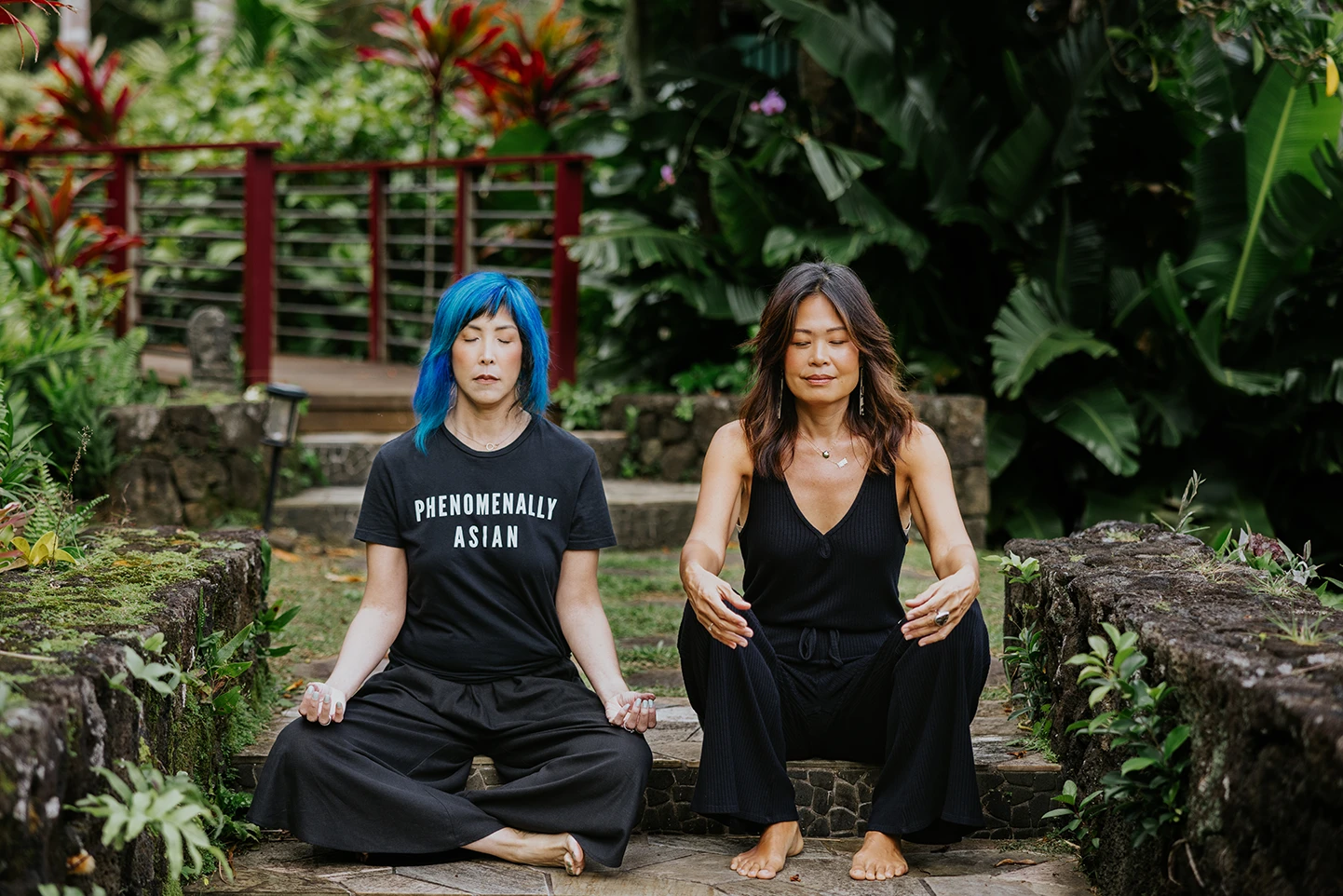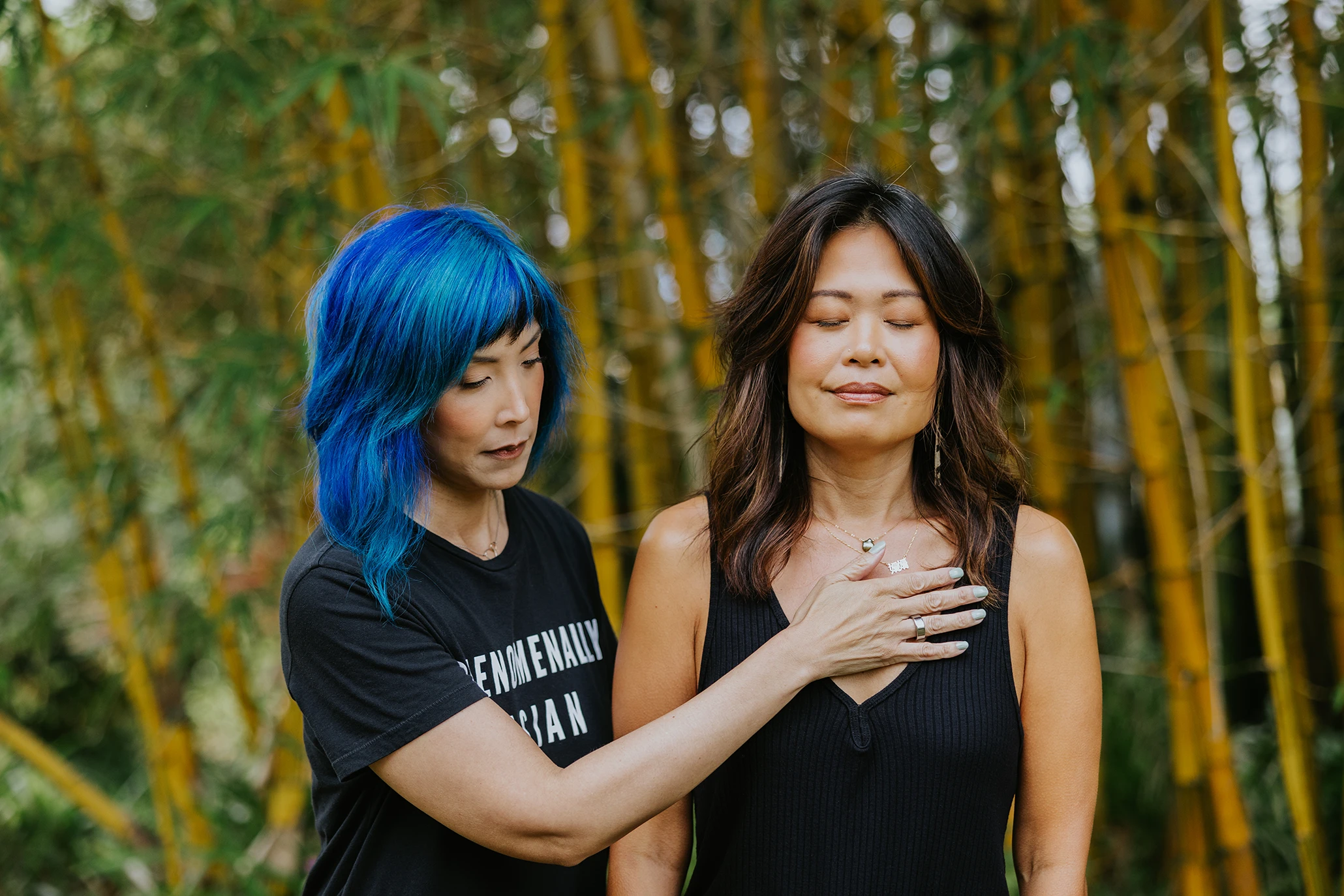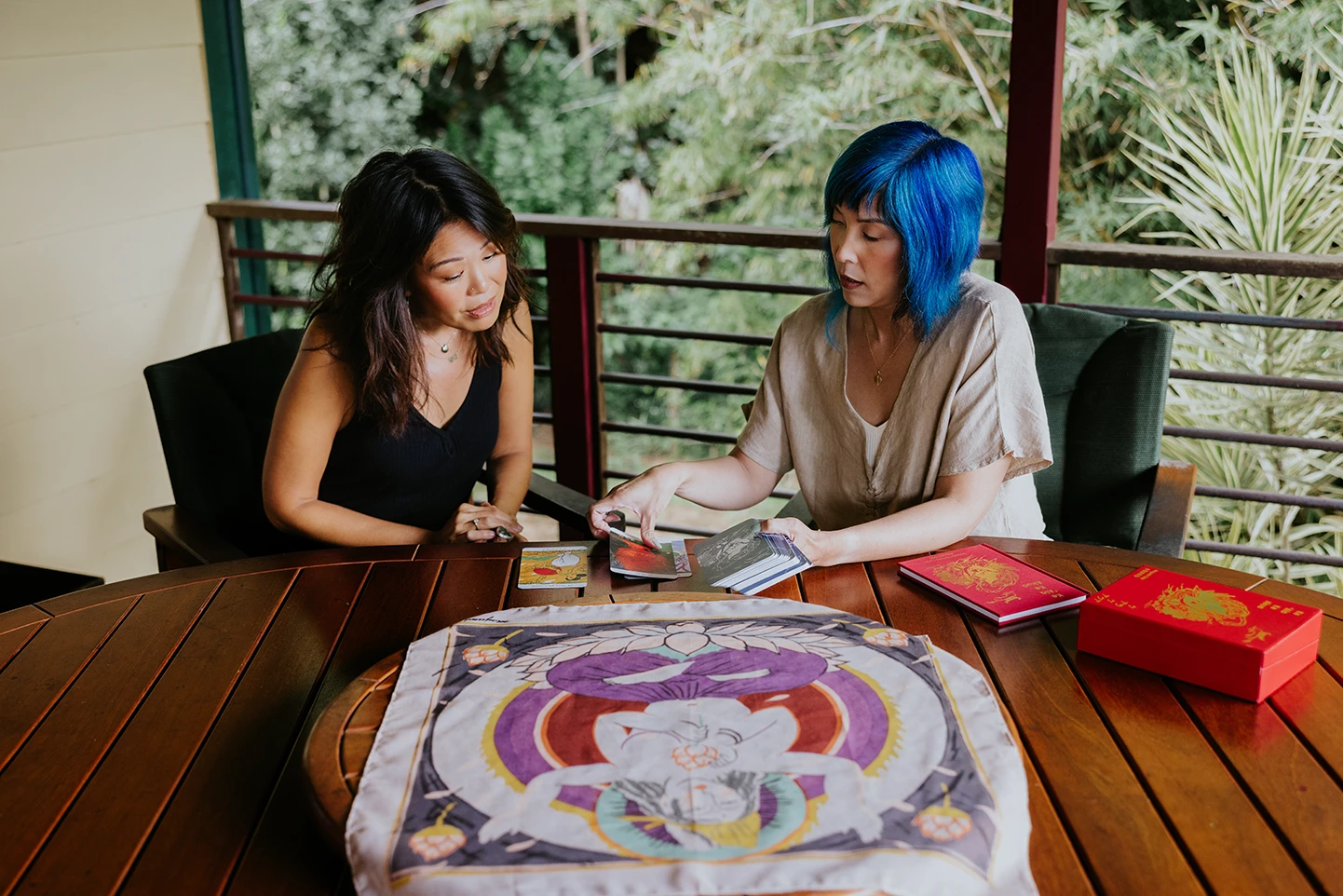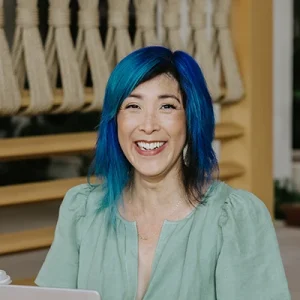
Let’s work together
1:1 Somatic, Trauma-Informed Coaching
Hello dear BIPOC creatives, empaths and activists!
Whew! There’s so much going on in the world right now, right?! Not to mention what’s already on your own plate(s)!
For us racialized folks who are heart-centered and sensitive, it all can feel like waaaaay too much.
But what would it be like if instead of getting stuck in overwhelm, activation or fear, you’re able to move through stress and challenges with more ease and self-compassion…
And even have room to let in more joy, creativity and wonder?
If you’re a (recovering) perfectionist/ workaholic/people-pleaser or a misfit, free spirit or (aspiring) unconventional person, you’re in the right place! I’d love to support you!

Do you relate to one or more of the following?
- You find it hard or impossible to say no to requests, people or projects (and everyone seems to come to you for everything!)
- You feel like you’re facing personal and/or professional challenges without enough support, community or resources to help you move through them with the ease and assurance you’d like
- You haven’t had enough time or space for the levels of creativity, pleasure, joy or awe you want in your life
- You sometimes have racing thoughts or can hyperfixate on a problem
- You find yourself feeling resentful or frustrated or perhaps you’re unintentionally losing your cool with friends, family or even that random customer service person 😉
- You often times feel tired, have difficulties concentrating or experience aches and pains
- You sometimes struggle with belonging or vulnerability
- You’re unsure when was the last time you did something fun or nourishing just for you
Or maybe you want to take things to the next level?
- You have a dream or goal you’re excited about but things such as procrastination, perfectionism or imposter syndrome may be getting in the way (a little or a lot!)
- You want to increase your capacity for authentic and aligned leadership and making the impact you want to have in your community
- You’re feeling pretty good about your work and your life and you know there are places where you may be holding back or that need more attention
What you might expect from our sessions…
Somatic, trauma-informed online coaching sessions are tailored to your needs and goals and are always client-led. I will offer invitations and you can always say yes, no or maybe something else.
I’ll support you with working through challenges, stress, overwhelm and tension while helping you to build more capacity for ease, well-being, groundedness, openness and expansion.
You’ll experience:
A confidential place to pause, slow things down and go at your own pace
Less talking about the past/stories, more being with what is showing up in the now (mindfully and compassionately)
Practices to orient, ground + care for your nervous system
Exploring sensations and emotions arising in the body and helping them move through
Co-regulation, gentle support, curiosity plus a playful approach
Politicized psycho-education and additional resources


10 online coaching sessions
We’ll meet for 60-min Zoom calls twice a month for 5 months.
Even though we’re virtual, you’d be surprised at how well the relational field translates online for this deep and connecting work.
Somatic practices
We’ll ground and orient to help us arrive more fully.
We’ll explore what you want to work on and tend to what is arising in the body moment by moment, gently allowing the nervous system to gradually release tension and reorganize.
Before we close, we’ll re-ground and integrate what came up for you on the call.


Email support between calls
Much of the integration continues in-between sessions as you incorporate what you’ve learned into your daily life.
I’m available for light support via email to answer questions or for you to check-in with me on things you may have committed to on our call such as a practice to work with, a journaling inquiry or an action to take toward your goals.
Somatic Experiencing lets us move at the speed of trust and helps the body unwind from layers of tension.
When we’re moving so fast for so long, stressors and (past, present and ongoing) trauma accumulates in our nervous system and tissues which can create a feedback loop of tension, pain and hyper vigilance.
By gently tracking the subtle movements and shifts in the body we help support the nervous system to complete any highly activated trauma responses that are stuck in the system. This discharge helps to the nervous system reorganize itself which creates more ease, flow and capacity.

Those of us who hold racialized or other marginalized identities are no stranger to the effects of oppression and trauma.
We carry the burdens passed down from our ancestors (and also their gifts and strengths!). We face systemic injustices and microaggressions on the regular. Constant weathering from all the -isms wear us down whether we’re aware of it or not. We may not have received the level of emotional support we needed from our caregivers who were focused on safety, survival or assimilation or who were themselves dealing with generations of inherited trauma. As a descendant of Japanese-Americans who were mass incarcerated during WWII by the US government simply for having the “face of the enemy,” I know all too well the toll of racialized and intergenerational trauma (and the subsequent attachment and developmental trauma).
While white supremacy’s structures, systems and culture were not built for us, WE can build for ourselves our own internal sense of safety, dignity and belonging. And from that resourced and centered place, we can create communities of collective care/action for us to thrive. Our liberation starts with us.
Any Questions?
What is trauma?
According to Dr. Gabor Maté, “Trauma is not what happens to you. Trauma is what happens inside you as a result of what happens to you.”
Something that is traumatic for one person may not be traumatic for another.
Some other ways of looking at trauma include: too much, too soon (like an accident or attack) or too little, for too long (such as childhood emotional neglect or systemic oppression).
Trauma can result from various experiences that overload the nervous system such as childhood emotional neglect or misattunement, physical or emotional abuse, abuses of power, violence, bullying, accidents, natural disasters, severe weather or climate change events, vicarious trauma, medical procedures (planned or emergency), illness, loss, forced displacement, war, genocide, cultural or legacy burdens, racism, sexism, heteronormativity, ableism, systemic oppression or any distressing experience that overwhelms a person’s ability to cope and leaves lasting emotional, psychological, and physical effects.
The trauma responses that you may be experiencing like strong or dulled emotions, distressing somatic symptoms or certain beliefs or behaviors are not your fault and nothing is wrong with you. Rather, you are having normal survival reactions to abnormal situations.
What is trauma recovery coaching?
Trauma recovery coaching is a specialized form of coaching that focuses on helping individuals who have experienced trauma to address their trauma and move forward in their lives.
What is Somatic Experiencing?
Somatic Experiencing is a body-oriented modality developed by Dr. Peter Levine that helps transform and heal stress and trauma. This gentle approach restores a sense of well-being and brings more ease and resilience in the body and nervous system.
How is trauma recovery coaching different from therapy?
I provide trauma recovery coaching not therapy or counseling, therefore I won’t be pathologizing your trauma responses, diagnosing or treating mental disorders, or prescribing a treatment plan, as that all falls outside the scope of coaching. If you are currently receiving care from a therapist, I encourage you to inform them about our coaching relationship. It’s important for them to be aware of any support or guidance you’re seeking from me as your coach.
Trauma recovery coaching is a mental health profession that incorporates the modalities of coaching and co-regulation to support clients in their recovery process. We use a client-led, goal-oriented approach that aims to empower survivors to reclaim their lives and work toward personal growth and resilience.
What other approaches or modalities inform Jenn’s coaching?
In addition to incorporating Somatic Experiencing into trauma recovery coaching, I draw on my decades of Co-Active Coaching skills as well as internal parts work, expressive arts, mindfulness meditation and Buddhist psychology principles, a social justice and anti-oppression lens, and embodiment, yoga and movement practices.
Is coaching effective online?
Yes, absolutely! I’ve been successfully coaching virtually for more than 20 years. It can feel like I’m right there with you and you get to be in the comfort and safety of your own space. The relational field translates over video conference and I use my skills of intuition, curiosity, attunement, deep listening, empathy and creativity to ensure we co-create a container that’s as safe, supportive and connecting as possible. Online calls also offer more scheduling flexibility and convenience plus we can work from practically anywhere in the world!
Why is the coaching offered in a package? Can I just do a one-off?
In my experience as both coach and client, change and healing takes time. Coaching tends to be more effective when clients are committed to a longer-term process. The regular rhythm of bi-weekly sessions across 5 months allows us to build and strengthen our coaching relationship over time (which is one of the keys to trauma recovery, especially for attachment-related trauma) and provides the space to “build new muscles” through consistent practice in an intentional container.
On rare occasions I may do a one-time session with someone I haven’t worked with yet.
What happens after our package is complete?
You’ll have the option to renew the package if you’d like to continue working together. Some clients choose to wrap up our work once the package is complete and they have reached their goals. Others stay on to deepen the work, focus on new goals or continue receiving support. Given that we’ve established our coaching relationship through the initial package, we can also look at less sessions and/or less frequency.
Do you offer a sliding scale?
Yes, I understand that systems of oppression by nature disenfranchise folks of color and other marginalized identities and as such not everyone has the same access to resources. I don’t want finances to be a barrier to folks getting the support they need. I’m offering tiered equity pricing (based on class analysis work I did in the Hawaiʻi People’s Fund Giving Project and some coaching with Nikki Blak) and there is a Supported pay-what-you-can rate. Please self-identify your tier based on your level of class privilege and access to resources (see some descriptions provided below in the pricing section).
I’m currently able to offer 2 spots at the Supported level. And with each additional client I have at the Have More Than Enough tier, I’m able take on one more client at the Supported level. So, for those of you with class privilege/access to resources, please pay as generously as you can to help redistribute resources to your BIPOC siblings while helping to keep my work sustainable. You can also feel free to reach out to me at hello @ jenniferayakolee.com to discuss other options.
What past clients have to say
Equity Tiered Pricing
Please mindfully consider your level of class privilege/access to resources and choose the price option that best aligns with your circumstances and ability to pay.
HAVE MORE THAN ENOUGH: You have class privilege and access to disposable income and/or generational wealth.
By investing at the HAVE MORE THAN ENOUGH level you help bridge the gap for clients with less access to money/resources and you’re helping to sustain Jenn’s work. For every client at this level, Jenn is able to take on an additional client at the Supported level.
You own your home or choose to rent and are able to consistently make payments.
You’re able to save for retirement, have various investments and are able to manage any debt you may have.
You’re able to easily enjoy a nice vacation or two a year, retreats, trainings, workshops or private lessons. You’re easily able to afford your self-care practices of choice.
You’re able to regularly donate to causes that are important to you and may even have a giving plan.
You and/or your family/ancestors benefited financially from assimilation.
$4000
HAVE ENOUGH: You have steady, reliable income.
By investing at the level you’re paying a fair rate and helping Jenn to meet her costs.
You’re able to pay your mortgage or rent, meet your expenses including unexpected ones and have some savings.
You and your household are able to enjoy some extras like an annual vacation, hobbies or massages and simple pleasures such as Netflix, buying your daily cuppa joe and/or occasionally eating out or going to the movies.
You donate to causes that are important to you when you can.
$2500
SUPPORTED: You’re under-resourced and don’t have access to steady income and/or generational wealth.
If the suggested Supported rate doesn’t work for you, please reach out to me at hello @ jenniferayakolee.com and let’s discuss.
You’re living paycheck to paycheck, you can run into challenges making rent or covering unexpected expenses like repairs, medical bills, etc. Your job or job prospects may be unstable.
You’re unable to consistently save and/or you’re carrying lots of debt.
You might rely on public transportation or may have an unreliable vehicle or are sometimes stretched to buy gas.
You’re not able to fall back on financial support from family if you’re in a pinch so you may look to mutual aid instead.
$750







Let’s connect
If you resonate with anything you’ve read here, let’s hop on a call together to see if we’d be a good fit.
I look forward to connecting!








